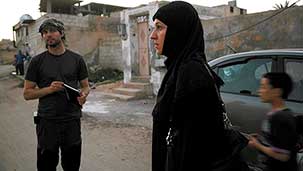Most mothers will tell you that they want to make the world a better place for their children. They’ll organize food drives, start petitions and maybe even attend the occasional anti-fracking protest - all noble efforts. But your mother, Anna, goes a wee bit further. She travels to some of the most dangerous places in the world in hopes of bringing war criminals to justice. She’s trying to make the world a better place. Not just for you, but for all of us.
I bet this gets her out of having to bring cupcakes to PTA meetings.
E-Team follows the Human Rights Watch emergency team which includes your mom, her husband Ole Sorang, Fred Abrahams and Peter Bouckeart. Their job is to investigate claims of human rights violations, namely the widespread reports of the killing of unarmed civilians (like Libya in 2011 and Syria in 2013). They go into areas of conflict and take statements from people who have just witnessed atrocities, then report these findings to Human Rights Watch and various news organizations.
Early in E-Team, when your mother and your step-father Ole prepare to leave for Syria, you are asked what you want for a souvenir. When you reply, “Bullet casings or shells, or bits of fragments are always welcome," I wondered if you fully understand the complexity of your mother’s job. When the filmmakers ask if she thinks you worry about her she says, “do you remember being twelve? He has a very comfortable life.” This is why your mother does what she does, so you and other children can live the kind comfortable existence where bullet casings and shells are considered cool gifts, and not a daily and deadly part of life.
You aren’t the only child featured in this film. Peter’s young daughters think Gaddafi is a cartoon villain who steals toys. We see Fred pushing his kids on a swing in New York City while his voiceover explains how he was an expert witness in the Slobodan Milosevic trial in 2002. Having been witness to the mass graves of civilians - many of them children - in Kosovo in 1998, Peter recalls the surreal yet satisfying experience of confronting the man he’d been tracking for ten years. This story alone has enough legs for its own feature doc, yet it illustrates the whole point of Human Rights Watch - to put war criminals on trial and to bring justice to victims. Fred also notes how rare it is to achieve this outcome.
This raises the stakes when we see Anna and Ole taking statements in a town that was demolished by air strikes only minutes before, or Peter using his vast knowledge of weaponry to prove that the Syrians did indeed gas their own people. The team is pragmatic about their incremental gains and small victories. They have to be. Peter very matter-of-factly explains that his job is to confront people with the reality of what is happening in another place, and they have to make the moral choices about what they want to do. The film itself takes a similar approach.
Unlike other capital ‘I’ important docs, E-Team didn’t make me feel like I was eating my vegetables. Instead of playing on my Western, middle-class guilt, E-Team shows their subjects living similarly comfortable lives, nary a hair-shirt in sight. It’s this lack of moralizing that gives the film gravitas.
And it’s worth noting the team effort behind the camera. The cinematography is assured, and only shaky-cam nauseating once when the team sneaks into Syria in the middle of the night – but that might have just been my nerves. The framing is never intrusive, whether it be your mom and Ole commiserating with their Syrian interpreter about his wife’s pregnancy, or you back home watching Mr. & Mrs. Smith. The camera, like the E-Team, merely observes and reports. One of the cinematographers was James Foley, who was beheaded by ISIL in August 2014. We find out the film is dedicated to him when the credits roll. It’s the last in a series of gut-punches this film delivers.
There comes a point in every child’s life when they truly appreciate the sacrifices their mother made for them. For most people, it’s not until they move out on their own that they fully understand just how much their mother did to give them a good life. Luckily for you, there’s a film that shows you just how hard your mother works to make a difference in the world. Luckily for all of us, she’s still out there doing it.
YOLO,
Di







